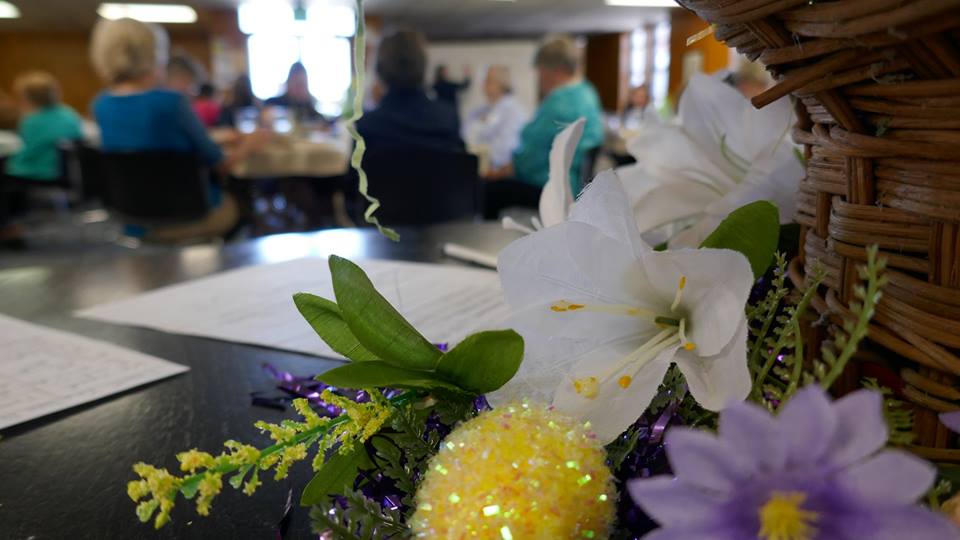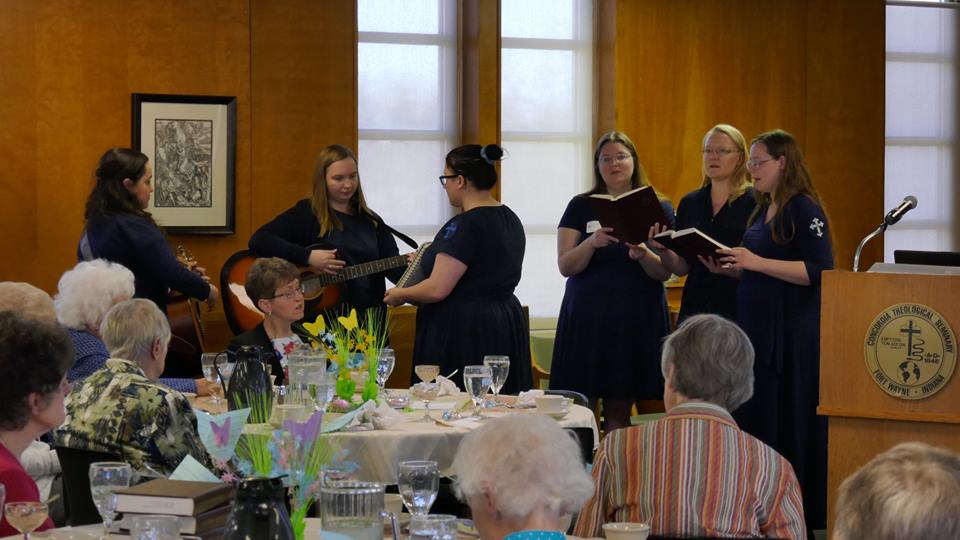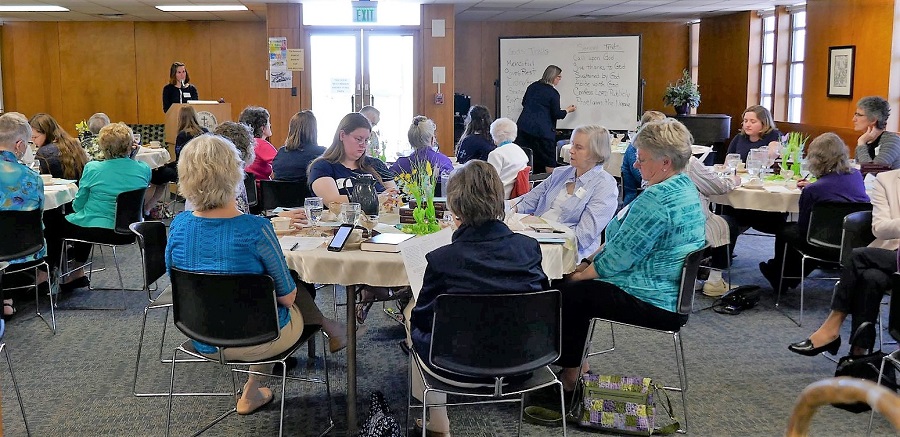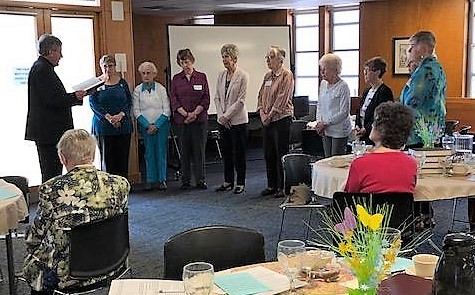
The Seminary Guild held their last meeting of the academic year yesterday, gathering for a luncheon that was preceded by some Guild business and thank yous from Director of the Food and Clothing Co-op, Katherine Rittner (who was once a student wife with six children, and knows their support firsthand—“We made it because of you,” she said to the ladies) and President Rast (“Your support is invaluable. You are truly a blessing”). It was followed by a keynote presentation, Bible Study, and the installation of the new board.
The keynote presentation featured deaconess students who had traveled to the Dominican Republic last May. Second-year deaconess student Kate Phillips began the topic, “God’s Mercy in Mission,” with an audio clip of school children singing “This Is the Day the Lord Has Made” in Spanish, from morning devotions in Santo Domingo. Showing a picture of a gate in front of one of the churches, designed as Luther’s Rose, she explained: “In this presentation we will open the doors of our experience to you.”

Accompanying on guitars (as Stephanie holds the music) are first-years (r-l) Kate Engebrecht and Emilyann Pool.
The goal of the mission work in Latin American is three fold: Spread the Word, Plant Churches, and Show Mercy. While there, the students were able to visit all four congregations in the Dominican Republic, attend Bible Studies, and visit schools and centers for mercy. “There’s something special about worshiping with brothers and sisters in a different language, but the same words” said second-year deaconess student Bethany Stoever. A Spanish hymnal is currently in the works, and the liturgy is very familiar even in a different language. Catechetical instruction is also very important to the mission in the Dominican Republic.
Culturally, time is far more relaxed; services start when people—especially the pastor—shows up. Church buildings are also barred outside of service hours for security reasons (a commonplace practice across the country). However, during offering, which is not passed around but rather carried individually to the front of the church, Bethany said, “It was truly humbling to see the members walking forward in front to drop off their gift.” Expenses in the Dominican Republic are very similar to American expenses, and yet minimum wage is $200 a month. Many people—even those with specialized education and careers in the medical field—have to work multiple jobs.
The Dominican people are very social, their homes incredibly close together. “The fellowship aspect of their culture is something America lacks,” Kate noted. During their visitations to homes in Palmar Arriba and Pueblo Nuevo, the deaconess students listened to the stories of these members’ lives, holding the hands of those they listened to and offering encouragement. They also participated in home Bible studies. “These are things we all need,” she said. “Prayer, human touch, and the Gospel. We are all part of the Body of Christ.”
Another second-year deaconess student, Stephanie Wilde, spoke of the seminary in the Dominican Republic. Seminario Concordia El Reformador serves the entire region, their nine students hailing from all over Latin America. The Deaconess Program there is not nearly as formal as that for the pastoral students, but Stephanie noted the many similarities between their seminary and ours: fieldwork, vicarage, and coffee and conversation between classes and chapel. “Building relationships is important,” she stressed. The three-story building shares space with a congregation and an elementary school, with the school on the first floor, the congregation worshiping on the second, and seminary classrooms and guest housing on the third. The dorms are located down the hill from the seminary.
Schools are also a great way to reach out into the community with the Gospel, as they are here in America, both today and historically. The school in Palmar Arriba serves preschool through sixth grade. Students pay $10 a month to attend, and the school’s finances are supplemented by a congregation in Florida. The school day begins with a Bible story taught by a deaconess, as they work to increase biblical literacy.
Chelsie MacIntosh, the final second-year deaconess student to speak, spoke of the special needs centers and programs they also visited, like the Good Shepherd Home and the Home for Adults with Developmental Disabilities. They traveled to centers that cared for orphan adults with disabilities; in one center, all but two of these men and women were nonverbal, having grown up in orphanages with no specialized care before they aged out.
One of the focuses of the mission work in the Dominican Republic at such places is to teach caregivers that these men and women are neither angels who are put on earth to teach people spiritual or moral lessons (whose physical needs thus come secondary), nor should they be neglected or dehumanized. The lack of care is almost always due to a lack of education. Patient care has improved as the nurses learn, and the care centers have changed from dehumanizing institutions where patients are referred to by numbers, to more home-like environments where patients are recognized as people with names and given opportunities to go outside. The greater goal has become to help them rejoin their families and communities.
The mission in the Dominican Republic has had a great impact, as the people have learned, as Chelsie put it, to “See with the eyes of light, to see them as people. It’s a beautiful model of how to care, seeing our neighbors as children of God.”
Deaconess Amy Rast, Associate Director of Deaconess Formation Programs, concluded the presentation with a thank you to the LWML (knowing that many of the women in the Seminary Guild serve both through the Guild as well as through their LWMLs at their home congregations) for supporting these missions. So far, nine graduates of the Deaconess Program here at CTSFW have served in Latin America, and two more will intern in the Dominican Republic in just a few months. You’ll find out which ones in less than three weeks, during Deaconess Internship Assignments.
Deaconess Rast also added that there are currently 37 women in the Deaconess Program right now, including both residential and long-distance students, as well as those on their internships. “Thank you for all that you do in support of that,” she said.
Brittni Brown, Deaconess Studies Program Intern, then followed up with a Bible study on Psalm 116. “You get to join us for a class,” she told the ladies. The deaconess students study psalms throughout their program, and this academic quarter features Psalm 116. “And I also love it,” she admitted with a smile.

I love the Lord, because he has heard
my voice and my pleas for mercy.
Because he inclined his ear to me,
therefore I will call on him as long as I live.
The snares of death encompassed me;
the pangs of Sheol laid hold on me;
I suffered distress and anguish.
Then I called on the name of the Lord:
“O Lord, I pray, deliver my soul!”
Psalm 116:1-4
The Seminary Guild then called their meeting to order, finishing with the installation of the new officers and closing devotions by Rev. Jim Fundum, Admission Counselor and theological adviser to the group. Their next meeting takes place after summer, on September 10, 2019, for the Getting to Know You Tea. “As Dorcas (Acts 9:36) supported the apostles as they spread God’s word, we, as sisters in Christ, have an opportunity to share God’s love through our support of the students, faculty, staff and the seminary as a whole,” the Seminary Guild explained in their meeting agenda. “We want our Guild to thrive for years and years to come, but do that, we need YOU. See you back here in September.”

